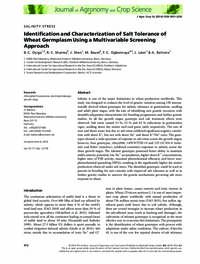Identification and Characterization of Salt Tolerance of Wheat Germplasm Using a Multivariable Screening Approach

Authors:
Salinity is one of the major limitations to wheat production worldwide. This study was designed to evaluate the level of genetic variation among 150 internationally derived wheat genotypes for salinity tolerance at germination, seedling and adult plant stages, with the aim of identifying new genetic resources with desirable adaptation characteristics for breeding programmes and further genetic studies. In all the growth stages, genotype and salt treatment effects were observed. Salt stress caused 33 %, 51 % and 82 % reductions in germination vigor, seedling shoot dry matter and seed grain yield, respectively. The rate of root and shoot water loss due to salt stress exhibited significant negative correlation with shoot K+, but not with shoot Na+ and shoot K+/Na+ ratio. The genotypes showed a wide spectrum of response to salt stress across the growth stages; however, four genotypes, Altay2000, 14IWWYTIR-19 and UZ-11CWA-8 (tolerant) and Bobur (sensitive), exhibited consistent responses to salinity across the three growth stages. The tolerant genotypes possessed better ability to maintain stable osmotic potential, low Na+ accumulation, higher shoot K+ concentrations, higher rates of PSII activity, maximal photochemical efficiency and lower nonphotochemical quenching (NPQ), resulting in the significantly higher dry matter production observed under salt stress. The identified genotypes could be used as parents in breeding for new varieties with improved salt tolerance as well as in further genetic studies to uncover the genetic mechanisms governing salt stress response in wheat.
